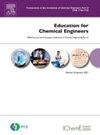Teamwork training and teaming skills to promote the development of professional competencies in chemical engineering students
IF 2.3
2区 教育学
Q1 EDUCATION, SCIENTIFIC DISCIPLINES
引用次数: 0
Abstract
We have implemented a sequential teamwork training focused on the development of teaming skills to enhance the perception of teamwork in the classroom and promote teaming as central to learning and to the practice of the chemical engineering profession. Our motivation for this work is the limited chemical engineering education studies emphasizing the benefits of a teamwork training centered around teaming skill development, implemented in laboratory environments, and developed within this context. As such, this training proposes an approach that promotes the practice of individual teaming skills, emphasizing psychological safety, and facilitating team learning through reflection within the classroom environment unique to the chemical engineering laboratories. This approach promotes effective teamwork by providing students with opportunities to experiment, contextualize their learning, and reflect on the teamwork experience. The training was incorporated to the chemical engineering laboratory sequence at the University of Texas at Austin. Our implementation suggests that the perception of teamwork in chemical engineering students can be enhanced by integrating activities and assignments that promote the development of teaming skills within a course structure that highlights the benefits of working in teams and creating effective collaborations. In addition, these course activities can be effective at helping students evaluate teamwork by assessing team learning and reflecting on how this learning can be applied to their future work in engineering teams. Student feedback on the experience indicates that the integration of a sequential training can help students perceive the benefits of working in teams and collaborating with their peers. In addition, our results suggest that by participating in the courses, our students have become more aware of the importance of teaming skills in the profession, and they are able to perceive teamwork and collaboration as practical tools to become more effective engineers.
团队合作训练和团队合作技能,促进化学工程专业学生专业能力的发展
我们实施了一系列的团队合作培训,重点是发展团队合作技能,以增强课堂上的团队合作意识,并将团队合作作为化学工程专业学习和实践的核心。我们进行这项工作的动机是有限的化学工程教育研究,强调以团队技能发展为中心的团队合作训练的好处,在实验室环境中实施,并在此背景下发展。因此,该培训提出了一种促进个人团队技能实践的方法,强调心理安全,并通过化学工程实验室独特的课堂环境中的反思促进团队学习。这种方法通过为学生提供实验、情境化学习和反思团队合作经验的机会,促进了有效的团队合作。该培训被纳入德克萨斯大学奥斯汀分校的化学工程实验室序列。我们的实践表明,化学工程专业学生的团队合作意识可以通过整合活动和作业来增强,这些活动和作业可以在课程结构中促进团队合作技能的发展,强调团队合作和创造有效合作的好处。此外,这些课程活动可以有效地帮助学生评估团队合作,通过评估团队学习,并反思如何将这些学习应用到他们未来在工程团队的工作中。学生对经验的反馈表明,连续培训的整合可以帮助学生认识到在团队中工作以及与同伴合作的好处。此外,我们的研究结果表明,通过参加课程,我们的学生更加意识到团队技能在专业中的重要性,他们能够将团队合作和协作视为成为更有效的工程师的实用工具。
本文章由计算机程序翻译,如有差异,请以英文原文为准。
求助全文
约1分钟内获得全文
求助全文
来源期刊

Education for Chemical Engineers
Multiple-
CiteScore
8.80
自引率
17.90%
发文量
30
审稿时长
31 days
期刊介绍:
Education for Chemical Engineers was launched in 2006 with a remit to publisheducation research papers, resource reviews and teaching and learning notes. ECE is targeted at chemical engineering academics and educators, discussing the ongoingchanges and development in chemical engineering education. This international title publishes papers from around the world, creating a global network of chemical engineering academics. Papers demonstrating how educational research results can be applied to chemical engineering education are particularly welcome, as are the accounts of research work that brings new perspectives to established principles, highlighting unsolved problems or indicating direction for future research relevant to chemical engineering education. Core topic areas: -Assessment- Accreditation- Curriculum development and transformation- Design- Diversity- Distance education-- E-learning Entrepreneurship programs- Industry-academic linkages- Benchmarking- Lifelong learning- Multidisciplinary programs- Outreach from kindergarten to high school programs- Student recruitment and retention and transition programs- New technology- Problem-based learning- Social responsibility and professionalism- Teamwork- Web-based learning
 求助内容:
求助内容: 应助结果提醒方式:
应助结果提醒方式:


